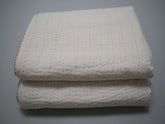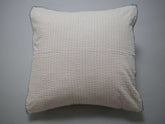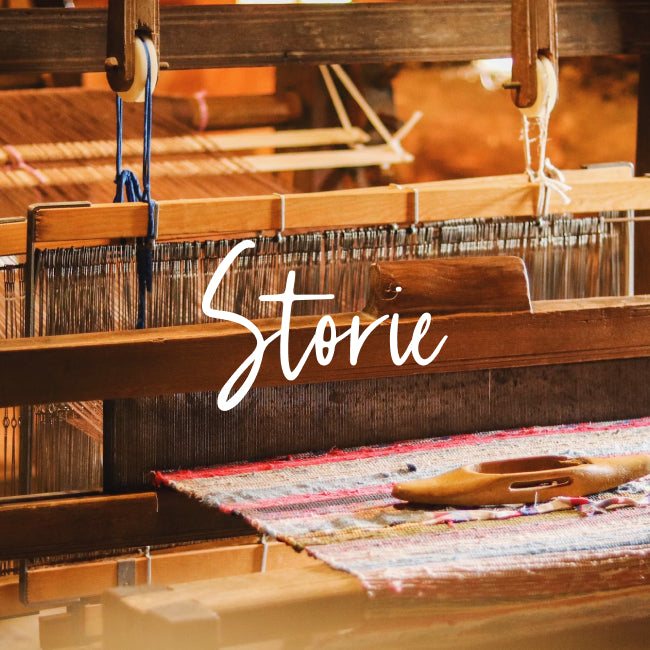BASHA : THE DOCUMENTARY
Storie is on the road again, this time to tell the stories of a group of resilient women who have built new lives for themselves and their children at Basha Bangladesh, which means the House of Hope. These women have broken the cycle of poverty or escaped prostitution and human trafficking, using both courage and talent, crafting embroidered blankets from recycled cotton. A millennia-old tradition known as Kantha.
When you pick up a throw made by Basha, you will notice a signature in the bottom corner of the cloth.

Each piece is unique, and is signed by the woman who made it. And of course every woman who works here has a story. Basha was set up in 2011 in Dhaka, Bangladesh as a fresh start, and safe environment for women and children at risk, and survivors of human trafficking. The organisation works to give women a sustainable livelihood making traditional textiles, and offers them a life of dignity.

Each woman’s experience is different “ but her circumstances have put her at high risk of harm or resulted in her exploitation and abuse.” according to Robin Seyfert, Basha’s founder.

Robin explains “Conservative estimates show that around 160,000 women in Bangladesh are working as commercial sex workers, and for most, this is not their choice. The reality is that this number is just a small sample of the number of women that are being exploited. Even more devastating, is that an estimated 29,000 underage girls are trapped in commercial sexual exploitation, robbing them of their childhood and causing a lifetime of trauma.”
Women who are trafficked or vulnerable to trafficking often want to move on from their past, and are keen to build better lives for themselves and their children; but the transition to a different life is difficult, “Both the complexity of poverty, and the many layers of trauma, need addressing first.”
Robin had worked in Bangladesh for an NGO focused on reproductive health training for women coming out of prostitution since 2006. Being engaged on the ground helped her understand how to attempt to stop the cycle of poverty and victimisation of women, “It takes a smart intervention to break the cycle of trafficking for good.”
Basha approaches the problem in several carefully designed steps.

Their charitable organisation Friends of Basha responds to the unique needs of groups of imperilled women in Bangladesh, working to ensure women are safe, well and healthy - offering them access to medical and psychological care.
Once women have finished training and care with Friends of Basha, then can then choose to join Basha Boutique, creating exquisite and unique hand made textiles which are sold across the globe. Basha Boutique has grown from 13 women in one small Dhaka flat to potentially more than 150 full-time production workers in textile centres throughout Bangladesh ( the figures do change, at the moment there are 110 women).

“From the 110 women currently working at Basha, there are 140 children being cared for at our daycare centres, as well as daily tutoring, the schools offer support and nutritious food to the kids of women in the programmes. We have 6 trainees graduating this month, 10 who just started, and 10-12 who will start in March. Basha Boutique, the company, pays the wages, benefits and the daycare expenses. While Friends of Basha pays for the training programme, daycare for children of trainees, food for the children each day.”
In the Bengali language basha means ‘house’ and asha means ‘hope’. “ Basha is the house of hope we’re building in Bangladesh.” Robin explains.
The scope of the project is ambitious, bold and brave; I ask Robin what element of running Basha is most demanding for her on a day to day basis; I’m glad I did, as her response did slightly change the way I see the project and the products Basha makes “It’s always a challenge to encourage people to produce. We employ and train trauma victims. These women aren’t necessarily craftspeople when they come to us. They arrive with their own very real problems, and finding that balance is difficult.”
To think of the whole process, the healing, the training that has gone before they’ve even begun working on the textiles, makes the end product, and the success of this scheme even more remarkable. For Robin, this is possibly the best bit about her job “ I continue to be astounded by how transformative a dignified job is, it is something everyone deserves, and it’s an amazing opportunity for a woman to develop.”
“We are creating a society where girls and women are empowered, valued, accepted, and have confidence to contribute to their family, community, and nation.”
Basha products use a traditional kantha stitch to sew together recycled and locally sourced new cloth. This is an ancient embroidery technique that has been passed down from mother to daughter for generations in the Bengal region of Bangladesh and India. The recycled cloth comes from worn saris, and these textiles are layered up and sewn together to make beautiful colourful covers, or the recycled material is used as the inner layers of a “new” kantha quilt, finished with natural unused cotton.

The process is labour intensive; a cushion cover will take 6-7 hours to make, while a large double bedspread will take around 37 hours. The kantha method is an important part of the region's heritage; buying these pieces not only are you supporting a brighter future for the artisans who have created the textiles but you are also protecting a rich cultural ancestry.

Artisan Stories
Mitra*: Mitra was abused in her village when she was about 13
years old. She went to Dhaka with a neighbour to work at a
garments factory to escape community pressure to marry her
abuser. Mitra worked three months without receiving any salary.
She met a woman who offered her work in a home. This woman
actually sold her to Doulatdia, the largest brothel in Bangladesh.
She was there for five months until a client helped her escape over
a wall and return to her village. Her mother didn't accept her back.
Mitra returned to Dhaka where she survived through street-based
prostitution until she was put into a vagrants home/prison for two
years. Since leaving there she worked on the streets until she
joined a training programme that helped her prepare to work at
Basha. Years of trauma have taken their toll but Mitra has come a
long way in rebuilding her life and parenting her son.
Joya*: Joya describes her life as “hard”. She married when she
was young and gave birth to her oldest son. Two years later her
husband died. Her second husband was abusive and didn't
support her. Joya started cooking for a men's hostel where she
was sexually abused which eventually led to her being in
prostitution. Joya's son drowned when he was six years old. Her
oldest daughter is grown but Joya is ensuring her teen daughter is
getting a good education. "Now I live a good life and I’ve forgotten
my past. I want to continue to build a good and respectable life for
myself. I am proud that I am doing a dignified job. I want my
daughter to have a good education and a successful life so she
doesn’t have to go through what I went through." Joya says.
Jamlah*: A broker helped Jamlah get a government visa to work in
Saudi Arabia as a house helper. She was placed with a large family
where she worked tirelessly, yet received only criticism." I am proud that I am doing a dignified job. I want my daughter to have a good education and a successful life so she doesn’t have to go through what I went through." - Joya When she asked for her salary, the family
told her that they had bought her from Bangladesh and it was enough that they were giving her food and shelter. When she protested, they abused her, leaving scars she still has. They refused to return her
passport or legal papers. She was able to reach the police who rescued her and helped her return to Bangladesh. Now Jamlah is working at Basha Enterprises where she has love, care and respect that
she never had in Saudi Arabia. She's able to support her family and is happy they are now all together. "I want a bright future for my children," Jamlah says. "Now I am earning well and able to buy food for my family."
Sources & further reading
Storie interview with Robin Seyfert, September 2022 and November 2022.
Storie interview with artisans at Basha November 2022.
https://www.state.gov/reports/2022-trafficking-in-persons-report/bangladesh/
https://www.elle.com/uk/life-and-culture/longform/a40923/bangladesh-husband-sold-me-to-a-brothel/
https://www.girlsnotbrides.org/
https://www.unodc.org/southasia/frontpage/2009/September/bangladesh_-interview-with-prof.-zakir-hossain-on-human-trafficking-.html














